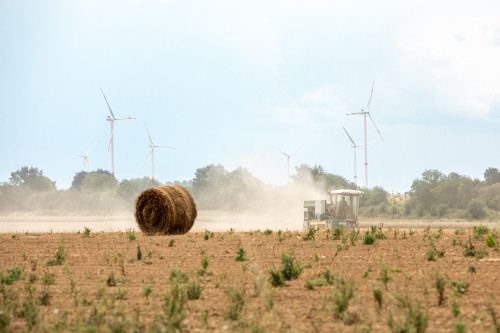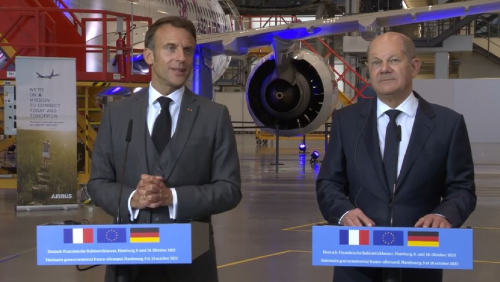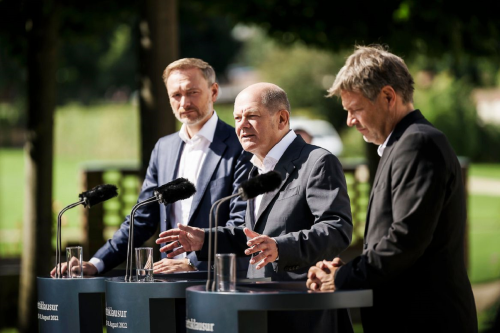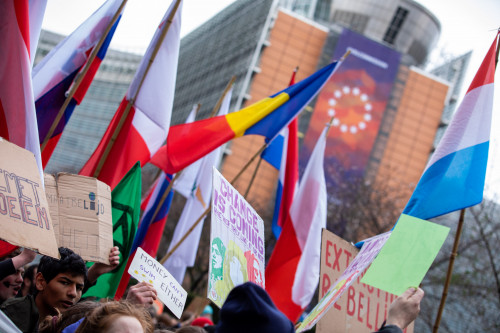|
|
|
CLEW Weekly
Friday, 13 Oct 2023
|
This week’s round-up of the top energy transition news and analysis from Germany and beyond, as well as the latest from the CLEW Journalism Network. Sign up to our Briefing for daily news, get CLEW background resources including factsheets and dossiers, or join the community of international energy transition journalists at www.cleanenergywire.org.
|
|
|


|
We are hiring!
An opportunity to join our team: We are looking for a student assistant for our events and our climate journalism network (m/f/d) for 10-20 hours/week in Berlin, to start immediately.
Find out more details
here.
|
|


|
European Union
by Sam Morgan, Brussels
The European Union announced itself as a potential early climate champion in 2018 by pledging to reach climate-neutrality by 2050. Yet, rules and regulations are needed to bring emissions down sufficiently to make ‘climate neutrality’ a feasible reality. A lot of work has been done but much is still on the agenda. Politics clashes with policy, continuing to influence
what degree of legislative ambition can be pursued. [Get a bird's-eye view of the European Union's climate-friendly transition in the CLEW Guide – How the European Union is trying to legislate a path to net-zero]
Stories to watch in the weeks ahead - Environment ministers from the EU member states meet
16 October for a Council meeting. On the climate diplomacy front, they will try to agree on the basis of EU’s position for the end-of-year COP28 summit. Possible initiatives that could be in focus at the Dubai summit include
global renewables and efficiency targets, as well as a
phase down of fossil fuel use. Environment ministers will also attempt to agree on updated
emission standards for heavy vehicles. Once that agreement is in place, talks can begin with the European Parliament;
- Energy ministers will attempt to broker a joint position on updated electricity market rules at a meeting on
17 October.
Announced in March as part of the EU’s response to the fossil fuel energy price crisis, the electricity market reform requires an agreement in Council between national governments before talks can start with
the European Parliament. Sweden — which held the Council presidency — attempted to wrap up a deal before the summer break but fell at the final hurdle and now it is Spain’s turn to chair the meeting. The biggest dispute revolves around
contracts for difference (CfDs), financial instruments that set a price floor for power generation and which obligate either the state to compensate producers when the price falls too low or asks producers to pay back profits when they rise too high. CfDs would be mandatory if state aid is involved in extending the lifetimes of existing power plants, which countries without nuclear power generation like Germany and Austria worry will give nuclear-reliant
France a competitive edge in the internal energy market. Talks between Berlin and Paris ahead of the 17 October meeting are ramping up, indicating that there is room for an agreement to be struck. There is, however, a ticking clock as the European Parliament will go into campaign mode ahead of June 2024 elections, meaning there will be little time in which an inter-institutional deal can be negotiated;
- The European Commission is
expected to publish a new Wind Power Package on 24 October, in a bid to help the clean energy industry up its game further. No new rules or regulations are expected at this stage. Instead, new support and recommendations on improving permitting procedures further, fine-tuning auction processes and streamlining access to financing are on the agenda. The Commission already announced plans to speed up permitting in 2022, as part of
its REPowerEU plan, so at this stage it is unclear if new support measures will be suggested or if it will be a repackaging of existing initiatives;
- Sticking with wind power: the EU
is considering launching a competition probe into Chinese subsidies for wind sector manufacturers. Europe’s wind industry has long argued that extra support is needed to combat the threat of Chinese state-backed imports. Acting-competition chief Didier Reynders did not rule out the prospect in
a recent interview. Brussels has already announced an investigation into Chinese electric vehicles imports, citing similar concerns, making the possibility of a parallel inquest into clean energy subsidies all the more likely. China strongly
opposed the probe when it was announced. The EU
is also expected to launch another inquest into Chinese steel at a summit with the U.S. later in October.
The latest from EU policymaking – last month in recap - Following the resignation of former Green Deal Commissioner Frans Timmermans who has instead decided
to run in the Dutch elections on 22 November, two new high-ranking EU official’s will head the bloc’s Green Deal and climate policies after their candidacies were officially given the green light
by the European Parliament. Maroš Šefčović, a Slovakian official, will take over Timmermans’ Green Deal duties — overseeing the EU’s wider efforts to go green — while Wopke Hoekstra, the Netherlands’ former foreign minister, will focus on climate. Hoekstra’s first major test will be the COP28 summit in Dubai, starting 30 November;
- Negotiators brokered
an agreement on new rules governing the use of fluorinated gases on 5 October. Most ‘f-gases’ –
which have a high degree of warming potential – will be gradually phased out by 2050 according to a now-agreed timeline. Sustainable alternatives will have to be used in appliances like fridges, air conditioning units and, crucially for the energy transition, heat pumps and switchgear for electrical systems.
Environmental groups lauded the deal as proof that the EU is a “climate leader,” while
the heat pump industry warned of short term pain and urged regulators to now focus on phasing out fossil-fuelled heating systems.
More details on f-gases here;
- The EU formally adopted its new renewable energy target of 42.5% by 2030 after national governments and lawmakers clashed over the content of the upgraded Renewable Energy Directive (RED). Now that
the European Council and
Parliament have both signed off on the agreement, it will be published in the EU’s official journal, meaning it will become law at the beginning of November. Hungary and Poland were the only countries to vote against the deal. The RED agreement plus another deal on boosting sustainable aviation fuels means that all of the Fit for 55 legislative updates, first published in 2021,
are now completed.
Sam’s picks - Highlights from upcoming events and top reads
Be sure to check out the following articles and podcast for more details about the important stories of the moment:
Some interesting events coming up soon:
[For a bird's-eye view of the EU's climate-friendly transition, check out the CLEW Guide – How the European Union is trying to legislate a path to net-zero]
|
|


|


12 May 2025
The European Union announced itself as a potential early climate champion in 2018 by pledging to reach climate-neutrality by 2050. Yet, rules and regulations are needed to bring emissions down sufficiently to make ‘climate neutrality’ a feasible reality. A lot of work has been done but much is still on the agenda. Politics clashes with policy, continuing to influence what degree of legislative ambition can be pursued. [UPDATES to May '25]
 |
|
| Source: European Union. |
|


|
|
Further background on CLEW
|
|
|
|
|
|
|


13 Oct 2023
Tageszeitung (taz)
A meeting of Germany’s state ministers for transport has not produced an agreement on securing future funding of the country’s new nationwide public transport ticket, newspaper Tageszeitung (taz) reported. Half of the costs caused by the “Germany Ticket,” which arose from an initiative to support commuters in the energy crisis and currently is priced at 49 euros
per month, could be financed through state budgets, the minsters agreed. However, the federal government has yet to greenlight funding of the other half. “There must be a way to continue funding and put it onto a sustainable footing,” the state ministers said in a joint statement seen by the newspaper. In 2023 and 2024, both the states and the federal government support the ticket with 1.5 billion euros each. However, the current scheme lacks funding for rising costs for staff and energy that add to the current calculation, with federal transport minister Volker Wissing so far ruling out any additional transfers from his ministry’s budget. Carina Konrad, MP for Wissing’s pro-business Free Democrats (FDP), told taz that “funding a safe, affordable and clean public transport system is a duty of the states.” Oliver Krischer, Green Party transport minister from North Rhine-Westphalia, said chancellor Olaf Scholz should take the initiative and find an agreement with the states at a meeting on 6 November. Ramona Pop, head of consumer protection organisation vzbv, said it would be a “particularly damaging signal for the transport transition” if funding for the ‘Germany Ticket’ remains hanging in the balance. “Those who want people to switch to public transport have to make it affordable and reliable,” she argued.
The nationwide ticket that allows use of buses, regional trains and other public transport options so far has not led to a significant reduction in car use, said a report by the Technical University of Munich. Data collected via surveys and smartphone apps show that only one in five new subscribers have used their car less. However, the measure has
generally been well received by citizens, with one in three saying they are interested in using the scheme.


|
|
Further background on CLEW
|
|
|
|
|
|
|


12 Oct 2023
dpa / Stuttgarter Zeitung
Germany has added 50 percent more new wind power capacity in the first nine months of 2023 than in the same time period last year, reports news agency dpa in an
article published by the Stuttgarter Zeitung. Preliminary figures seen by dpa show that 518 new turbines were
constructed between January and September, corresponding to an additional 2.4 gigawatts capacity. Most of the expansion occurred in the German state of Schleswig-Holstein, with Lower Saxony and North Rhine-Westphalia, all northern states, following. However, 316 old turbines were shut down since January, leaving a net increase of 202 installations, with newer ones being much more efficient.
Part of the reason for the uptick is the increased rate of approval for new turbines, the agency reported. The first nine months of this year saw the approval of 976 turbines across the country, equivalent to an capacity increase of 77 percent. According to the Fachagentur Windenergie, who provided the data, there have never been so many approvals during the time period in previous years.
Despite more approvals, the wind industry has said the country’s autobahn operator are
sabotaging the roll-out of wind turbines by refusing the necessary permits to transport parts. Southern states are also slow to grow their wind industries, with Chancellor Olaf Scholz recently
referring to their expansion as depressing.


|
|
Further background on CLEW
|
|
|
|
|
|
|


11 Oct 2023
Clean Energy Wire
France and Germany could soon agree on a reform of the EU electricity market, French president Emmanuel Macron and German chancellor Olaf Scholz have said after their meeting in the northern German port city of Hamburg. A solution in the debate between Paris and Berlin on maintaining competitiveness in Europe while transforming the industry towards climate neutral procedures could still be achieved in October, the French president said at a press conference
following the informal two-day meeting between government members of both countries in Scholz’s hometown. “Of course, we have two very different models at the national level,” Macron said. “We’ve discussed this profoundly and in an encouraging fashion and agreed our teams want to work together in the next weeks to arrive at a necessary agreement by the end of the month.” The priority would be “to have a Europe with one coherent strategy,” Macron said, adding that this would currently be needed with respect to the U.S., “which is less dependent and has lower prices.”
Chancellor Scholz said Germany and France agreed on climate action targets, even if they pursued different approaches to achieve them. The fact that France bets on nuclear power and Germany instead aims for 100 percent renewables and a massively expanded power grid “is no reason for antagonism but simply represents two different decisions,” Scholz argued. He added he was “confident” that a solution for the EU power market reform could be found quickly. “And this is most likely if Germany and France develop it together.” The chancellor added that both countries had drafted a strategy to reduce bureaucracy in the European Union that will allow policy decisions to take effect faster and more comprehensively.
Germany and France must focus on “simple stuff” on the way to climate neutrality by 2050: leaving gas and coal, establishing greater energy efficiency, renewable power sources and nuclear energy. “Everyone says that,” the French president argued, adding that a strategy that excludes one of these elements could not succeed. “It would be a historic mistake to think in the short term here and decide for either renewables or nuclear power. This would not work.” Bringing emissions down in the most cost-efficient manner and simultaneously creating “a free market for low-CO2 electricity production” should now be the focus, Macron said, adding that the two leaders agreed that “we don’t want subsidies for energy-intensive production.”
The statements by the two government leaders came one day after another joint press conference in Hamburg, in which both Macron and Scholz underlined the need for greater industry cooperation and
hailed aircraft manufacturer Airbus as a role model for future projects between the two countries amid the EU's efforts to move towards climate neutrality.


|
|
Further background on CLEW
|
|
|
|
|
|
|


10 Oct 2023
German chancellor Olaf Scholz and French president Emmanuel Macron held an informal meeting aimed to nurse the crucial Franco-German axis for Europe’s industrial transformation on the way to climate neutrality. In Hamburg, northern Germany, the leaders visited European aircraft manufacturer Airbus’s plant and praised the French-German joint venture as a model for future industry cooperation amid the “ecological transition” that could create new European champions. The get-together,
which included ministers from both countries, followed months of difficult negotiations between Berlin and Paris about the role of nuclear power in EU climate policy plans and came ahead of a crucial EU energy ministers’ meeting that could result in a decisive reform of the bloc's electricity market rules.
 |
|
| Souce: Bundesregierung (screenshot) |
|


|
|
Further background on CLEW
|
|
|
|
|
|
|


09 Oct 2023
The parties of Germany’s government coalition suffered heavy losses in two state elections in economically strong Hesse and Bavaria in western and southern Germany, while populist parties including the far-right AfD celebrated significant gains. The Conservatives (CDU/CSU) successfully defended their leadership in both states, but many voters turned their back on chancellor Olaf Scholz’s federal coalition parties, the Social Democrats (SPD), Greens and Free Democrats (FDP). While the
success of the AfD can largely be attributed to voters’ rejection of immigration, the result is likely to also trigger a debate about the federal government’s approach to climate and energy policy, and signals that the room for finding compromise on emissions reduction efforts might be shrinking in the country, activists fear.
 |
|
| Photo: Bundesregierung/Denzel |
|


|
|
Further background on CLEW
|
|
|
|
|
|
|


05 Jun 2025
Journalists! Mark your calendars – or rather let us do it for you.
Europe is complicated and even journalists from EU member states sometimes struggle to understand how climate and energy policy is made, and when institutions take key decisions. This timeline flags key European energy and climate reporting events and developments and includes concise background information necessary to jump-start your coverage.
 |
|
| Source: European Union. |
|




13 Nov 2023
Germany plans to boost the international competitiveness of its prized heavy industry by lowering electricity taxes and expanding existing subsidy schemes. The package of measures worth 12 billion euros in 2024 alone is set to end a months-long dispute within the coalition, and means that economy minister Robert Habeck's proposal for a capped industry electricity price, which raised EU concerns about unfair competition, is shelved. Industry associations welcomed the package and said it
would help strengthen Germany as a business location. [UPDATE 13 November: Government agrees package, earlier proposal for industry power price is shelved]


|
|
Further background on CLEW
|
|
|
|
|
|


|
15 October: Polish parliamentary election. [See the CLEW Guide –
Upcoming election will shape direction and pace of Poland’s energy transition]
16 October:
Environment Council meeting on COP28, LUXEMBOURG.
17 October:
Energy Council meeting on the EU electricity market design, LUXEMBOURG.
17 October: German Geothermal Association (BVG),
Geothermal Congress, ESSEN.
17 October: IEA,
Electricity Grids and Secure Energy Transitions, ONLINE.
19 October: German Renewable Energy Federation (BEE) webinar "Energy policy mid-term review of the traffic light government," ONLINE.
19 October:
Agora Energiewende, "Transition from national fuel emissions trading to ETS II," BERLIN and ONLINE.
19 October: Institute for Climate Protection, Energy and Mobility (IKEM) conference "Climate Construction Site Motorway," BERLIN.
19 - 20 October: Handelsblatt conference "Decarbonisation of industry," DÜSSELDORF.
Find more events in the
CLEW calendar.
More online events on climate change/energy/journalism: Clean Energy Wire is maintaining a list of online events and webinars related to climate change, energy and journalism, which we update regularly. You can find the list
here.
For more European events, see
What’s next in Europe? – Timeline of European climate and energy policy.
|
|
|
|
|
|
|
|
|
|
 |
Clean Energy Wire CLEW
Dresdener Str. 15, 10999 Berlin
T: +49 30 62858 497
info@cleanenergywire.org
© Clean Energy Wire CLEW, All rights reserved.
|
|
|
|